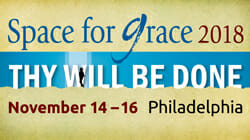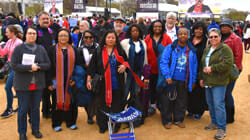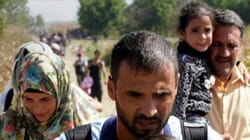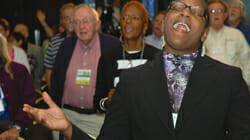Be angry but do not sin
By Rev. Dr. Cheryl F. Dudley
So then, putting away falsehood, let all of us speak the truth to our neighbors, for we are members of one another. Be angry but do not sin; do not let the sun go down on your anger, and do not make room for the devil. ─ Ephesians 4:25-27 (NRSV)
The sun has gone down many evenings, yet anger, deep anxieties and righteous indignation in relation to the series of recent killings affecting black and brown persons, as well as blue-uniformed persons of all hues, has not been quelled. Violent incidents and eruptions across our country have been evident for far too long and seem to have an unceasing pace.
We’ve now had a few days to cough in the smog of this latest series of deaths and injuries, and they threaten to clog our hearts and souls. Scar tissue has formed within us, creating great callouses borne of resentment and pain. Callouses emerge to protect our most tender parts. Yet, a callous on the heart or soul is not a good thing. In the absence of spiritual or emotional protection, we are in danger of being rubbed raw from friction or overexposure. In times like these, we need the Savior, who knows we need a balm, and bids us to drink deeply from the well that contains living water. As people of faith, we know we cannot save ourselves or go forward without God.
I would have loved to have been in worship in a number of our New York City churches on the Sunday after the latest tragedy, to hear our finest pastors and prophets lift us up, despite the threat of despair, to continuing and deeper faith in God, to love one’s neighbor, and to pray for our perceived enemies. Pastors will continue to be in our prayers as they break open the bread of life to feed the souls of those hungry for hope and healing. We thank God daily for the abiding devotion of our shepherds.
The expendability of some lives in this country and outside our borders appears to be a casualty of a mentality of war present in U.S. military activity outside of our country, but now manifest within our sight in the streets of our nation. Offensive, defensive and retaliatory actions, through the use of arms, reinforces a cycle of war that is aggressive and turned inward at U.S. citizens. Our individual and collective bodies and souls remember each time something else happens─when someone else is killed or injured. Alarms sound when some of us are needlessly stopped by police. When it happens, we flinch, get our backs up and are apt to angrily retort when we believe we have been unjustly targeted. I know that I have. Experience now tells us that any response might possibly be perilous.
This Sunday, after church, I slowly drove behind a white friend to an agreed-upon destination. When we both finally arrived, she asked if I was going particularly slowly for fear of being stopped by police. I thought that perhaps I was. More importantly, this question led us to an honest discussion about fears and anxieties that were up to that time unspoken but hovering in the air. We needed to talk together about the chronic and senseless loss of human lives─those who are most at risk and those who have the privilege of bearing less risk in the daily living of their lives. Race greatly influences our experiences and perspectives on targeting and privilege.
In the historic case of Plessy v. Ferguson, the U.S. Supreme Court upheld the constitutionality of laws requiring racial segregation under the doctrine of separate but equal. In 1896, the separate but equal decision was upheld in a 7-1 vote. Separate but equal remained the standard until repudiated by the Supreme Court in 1954 in its Brown v. the Board of Education decision, which finally legally disallowed state-sponsored segregation.
Although laws have now been passed and certain legal understandings have been gained, the manifestation of dis-equal treatment continues to prevail in our public consciousness, particularly in the experiences of persons of color. What it feels like to be fully human, and not three-fifths human or nearly human─meaning full protections, rights and privileges─has consistently eluded persons of color in the United States. We gained a glimpse of hope that full humanity might actually be more than a myth when President Barack H. Obama was elected in 2008, but the backlash against that hope of progression toward full humanity for persons of all hues has been unrelenting.
So we have continued work to do in this and other areas. The Ephesians 4 text cited at the beginning of this piece reminds us of Jesus’ teachings about our neighbors. They are not always who we think they are. So let us not grow tired in well-doing but love God─especially now─with all of who we are, and seek always to recognize and love our neighbor as our own kin. “Be angry but don’t sin” is the directive for us all.
Open my eyes that I may see glimpses of truth Thou hast for me.
Open my ears that I may hear voices of truth Thou sendest clear.
Open my mouth and let me bear tidings of mercy everywhere.
Open my mind that I may read more of They love in word and deed. [1]
Rev. Dr. Cheryl F. Dudley
Regional Executive Minister
American Baptist Churches of Metropolitan New York (ABCMNY)
[1] “Open My Eyes, That I May See” hymn, Clara H. Scott, 1895.
Additional resources
- 2013 & 2015 ABCMNY Statements on Police Reform and Gun Violence
- Dr. Cheryl F. Dudley’s Facebook message
Previous Story | Story 16 of 16
— The Christian Citizen —






